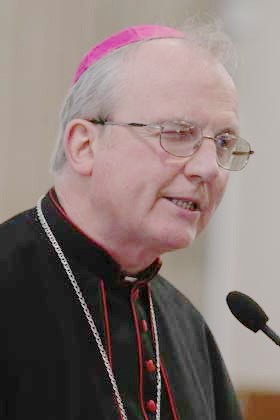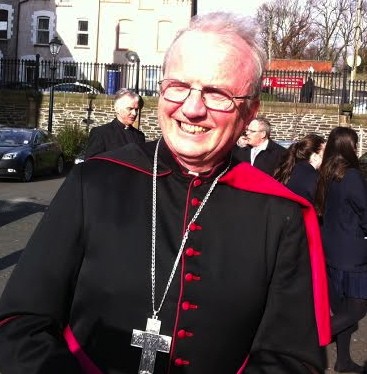 BY Bishop of Derry, Rev Dr Donal McKeown: We have now reached the 8th day of Christmas, which means we have still four days left to savour the complexity of this God, born into our midst – and to do what the Gospel tell us about Mary, “she pondered all these things in her heart.”
BY Bishop of Derry, Rev Dr Donal McKeown: We have now reached the 8th day of Christmas, which means we have still four days left to savour the complexity of this God, born into our midst – and to do what the Gospel tell us about Mary, “she pondered all these things in her heart.”
As we try to see the import of Christmas, the readings provide us with a staggering array of themes, from the birth to the Holy Innocents to the Feast of the Holy Family and today’s of Mary’s Motherhood. We don’t know much about the early life of Jesus. The child of Bethlehem and Nazareth may well have had a happy childhood in the heart of his loving family – but the biblical stories indicate that he was a source of controversy from his flight into Egypt till his death on Calvary. His mother, Mary, might not have understood the words of Simeon that a sword would pierce her heart because of the baby Jesus. But she certainly had to say more than once, “I am the handmaid of the Lord. Let it be done to me according to your word.” She wasn’t the only parent who had to cope with huge pain and distress because of their love for the children they bore and reared. If Jesus is God-with-us, then Mary is in a particular way a parent-with-us. She had to cope with the awkward circumstances of his birth and paternity, his being lost in the Temple, his preaching style that make some of his family think he was mad and then his apparent defeat by being tortured to death on a Cross. The Magi may have brought gold for a king, frankincense for a priest – but they also carried myrrh, to anoint his body for death. The world was always a dangerous place, especially for the weak, the vulnerable and the outsider.
“On this World Day of Peace, Pope Francis asks us to reflect on the reality of slavery and people-trafficking around the world. The British Empire may have officially abolished slavery in 1833, just four years after Catholic Emancipation. And it may have been outlawed in the USA some 32 year later. But the UN estimates that about 30 million people are still treated as slaves in different ways – and that between 2 and 4 million are trafficked annually as sex slaves. Pope Francis, who has called for a new discovery of our membership within God’s family of the Church, now also underlines the need to globalise fraternity. That means not just seeking to identify where such things be happening in our own environments but also being committed to never purchasing goods that may have been produced by those who are held in slavery of one sort or another.
“As is the case with every problem, the Pope says that one of the biggest obstacles to changing that reality is not just the nature of organised crime or the human ability to be brutal. In most things that can go wrong in society, the problem continues because of indifference. I can’t do anything about this. Somebody else should tackle this. We have enough problems here. These obstacles have always arisen when people were faced with challenges. The people of Israel, on their way out of slavery in Egypt complained and wanted to go back when things got tough. Some of Jesus’ own followers left him when he spoke of eating his flesh and drinking his blood. But as the old phrase says, when the going gets tough, the tough get going. Nothing would have changed here except for the courage of some individuals and groups who were not daunted by the prospect of tackling what seemed to be impossible odds. On this World Day of Peace, we hear that consistent Gospel message of Pope Francis that, in the service of the Prince of Peace, believers have to take the risk of being an unwelcome prophetic voice. In a culture that risks prioritising self-indulgent entertainment, it is hard to proclaim generosity and solidarity with the weak. But if Jesus did it, we have no choice but to follow in his footsteps.
“Of course, it is comparatively easy to roundly despise all forms of slavery and exploitation of the weak around the world. But if we are to move from cost-free condemnation to solidarity, we have to look carefully at any ways that our society also traps people and makes it easier to exploit them. Poverty is not just the absence of some material essentials but includes a sense of being left outside or looked down on. There can be a huge poverty of expectations – from life, from relationships and from tomorrow. Thus unemployment or unemployability can mean that too many of our young people feel excluded from what is seen as respectability and desirable. Our banking system got us into huge debt – but it is the poorest, who will pay to service the huge public debt incurred to rescue the banks. Our education system is seen by some as dominated by the power and privilege of the successful, who want to look after themselves, no matter what the cost to others. The implication is that the rest should be grateful for what they get and stop complaining. And within Church, there is the temptation to believe that grace and virtue are the prerogative of the few and not of the crowds for whom Jesus had so much compassion. Any elitist clinging to power or prestige is unworthy of followers of the Bethlehem baby.
“So Pope Francis’ call for all of us in 2015 is to ‘globalise fraternity, not slavery or indifference’ at home and abroad. We live in an age that is short on hope for what the future might bring – and we take refuge in enjoying and protecting the present. But the Pope’s message for this World Day of Peace encourages us to world confidently to build a better future. Whether we are thinking of slavery in other countries or those trapped in hopelessness around the corner, Pope Francis says that it requires all of us to forge a new worldwide solidarity and fraternity capable of giving them new hope and helping them to advance with courage amid the problems of our time and the new horizons which they disclose and which God places in our hands.
“Can we start by asking how our parishes and schools might
– Check whether any of our practices and structures enslave people in a sense of their permanent exclusion or unworthiness; and Ask ourselves whether our Catholic school system might sometimes prioritises good news for the poor above protecting the privileges of the strong?
“That might lead us to all sorts of strange and uncomfortable New Year resolutions.”






